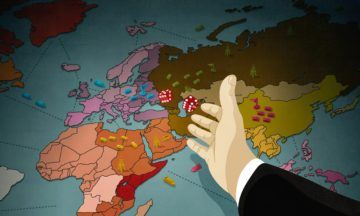Daniel Immerwahr in The Guardian:
 On the first page of his 2015 blockbuster book, Prisoners of Geography, Marshall invited readers to contemplate Russia’s topography. A ring of mountains and ice surrounds it. Its border with China is protected by mountain ranges, and it is separated from Iran and Turkey by the Caucusus. Between Russia and western Europe stand the Balkans, Carpathians and Alps, which form another wall. Or, they nearly do. To the north of those mountains, a flat corridor – the Great European Plain – connects Russia to its well-armed western neighbours via Ukraine and Poland. On it, you can ride a bicycle from Paris to Moscow.
On the first page of his 2015 blockbuster book, Prisoners of Geography, Marshall invited readers to contemplate Russia’s topography. A ring of mountains and ice surrounds it. Its border with China is protected by mountain ranges, and it is separated from Iran and Turkey by the Caucusus. Between Russia and western Europe stand the Balkans, Carpathians and Alps, which form another wall. Or, they nearly do. To the north of those mountains, a flat corridor – the Great European Plain – connects Russia to its well-armed western neighbours via Ukraine and Poland. On it, you can ride a bicycle from Paris to Moscow.
You can also drive a tank. Marshall noted how this gap in Russia’s natural fortifications has repeatedly exposed it to attacks. “Putin has no choice”, Marshall concluded: “He must at least attempt to control the flatlands to the west.” When Putin did precisely that, invading a Ukraine he could no longer control by quieter means, Marshall greeted it with wearied understanding, deploring the war yet finding it unsurprising. The map “imprisons” leaders, he had written, “giving them fewer choices and less room to manoeuvre than you might think”.
There is a name for Marshall’s line of thinking: geopolitics. Although the term is often used loosely to mean “international relations”, it refers more precisely to the view that geography – mountains, land bridges, water tables – governs world affairs. Ideas, laws and culture are interesting, geopoliticians argue, but to truly understand politics you must look hard at maps.
More here.
